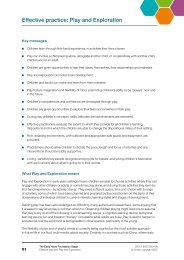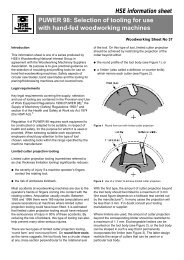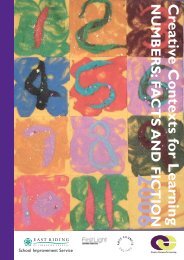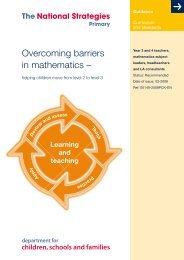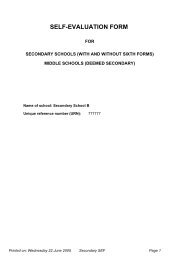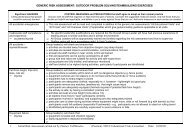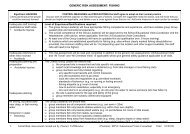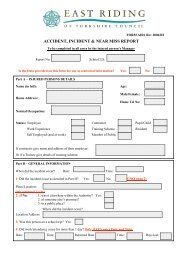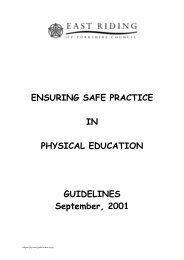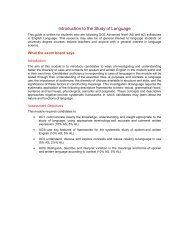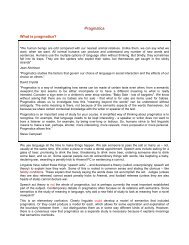Knowledge and Understanding of the World - Early Years Matters
Knowledge and Understanding of the World - Early Years Matters
Knowledge and Understanding of the World - Early Years Matters
Create successful ePaper yourself
Turn your PDF publications into a flip-book with our unique Google optimized e-Paper software.
Learning <strong>and</strong> Development<br />
<strong>Knowledge</strong> <strong>and</strong> Underst<strong>and</strong>ing <strong>of</strong> <strong>the</strong> <strong>World</strong><br />
The <strong>Early</strong> <strong>Years</strong><br />
Foundation Stage<br />
Requirements<br />
Children must be supported<br />
in developing <strong>the</strong> knowledge,<br />
skills <strong>and</strong> underst<strong>and</strong>ing that<br />
help <strong>the</strong>m to make sense<br />
<strong>of</strong> <strong>the</strong> world. Their learning<br />
must be supported through<br />
<strong>of</strong>fering opportunities for<br />
<strong>the</strong>m to use a range <strong>of</strong> tools<br />
safely; encounter creatures,<br />
people, plants <strong>and</strong> objects<br />
in <strong>the</strong>ir natural environments<br />
<strong>and</strong> in real-life situations;<br />
undertake practical<br />
‘experiments’; <strong>and</strong> work<br />
with a range <strong>of</strong> materials.<br />
Aspects <strong>of</strong> <strong>Knowledge</strong> <strong>and</strong><br />
Underst<strong>and</strong>ing <strong>of</strong> <strong>the</strong> <strong>World</strong><br />
<strong>Knowledge</strong> <strong>and</strong> Underst<strong>and</strong>ing <strong>of</strong> <strong>the</strong> <strong>World</strong> is made up<br />
<strong>of</strong> <strong>the</strong> following aspects:<br />
Exploration <strong>and</strong> Investigation – is about how children<br />
investigate objects <strong>and</strong> materials <strong>and</strong> <strong>the</strong>ir properties,<br />
learn about change <strong>and</strong> patterns, similarities <strong>and</strong><br />
differences, <strong>and</strong> question how <strong>and</strong> why things work.<br />
Designing <strong>and</strong> Making – is about <strong>the</strong> ways in which<br />
children learn about <strong>the</strong> construction process <strong>and</strong> <strong>the</strong><br />
tools <strong>and</strong> techniques that can be used to assemble<br />
materials creatively <strong>and</strong> safely.<br />
ICT – is about how children find out about <strong>and</strong> learn<br />
how to use appropriate information technology such<br />
as computers <strong>and</strong> programmable toys that support<br />
<strong>the</strong>ir learning.<br />
Time – is about how children find out about past <strong>and</strong><br />
present events relevant to <strong>the</strong>ir own lives or those <strong>of</strong><br />
<strong>the</strong>ir families.<br />
Place – is about how children become aware <strong>of</strong> <strong>and</strong><br />
interested in <strong>the</strong> natural world, <strong>and</strong> find out about <strong>the</strong>ir<br />
local area, knowing what <strong>the</strong>y like <strong>and</strong> dislike about it.<br />
Communities – is about how children begin to know<br />
about <strong>the</strong>ir own <strong>and</strong> o<strong>the</strong>r people’s cultures in order<br />
to underst<strong>and</strong> <strong>and</strong> celebrate <strong>the</strong> similarities <strong>and</strong><br />
differences between <strong>the</strong>m in a diverse society.<br />
Creative<br />
Development<br />
What <strong>Knowledge</strong> <strong>and</strong> Underst<strong>and</strong>ing<br />
<strong>of</strong> <strong>the</strong> <strong>World</strong> means for children<br />
■ Babies <strong>and</strong> children find out about <strong>the</strong> world<br />
through exploration <strong>and</strong> from a variety <strong>of</strong> sources,<br />
including <strong>the</strong>ir families <strong>and</strong> friends, <strong>the</strong> media, <strong>and</strong><br />
through what <strong>the</strong>y see <strong>and</strong> hear.<br />
■ Babies <strong>and</strong> children need regular opportunities<br />
to learn about different ways <strong>of</strong> life, to be given<br />
accurate information <strong>and</strong> to develop positive <strong>and</strong><br />
caring attitudes towards o<strong>the</strong>rs.<br />
■ Children should be helped to learn to respect<br />
<strong>and</strong> value all people <strong>and</strong> learn to avoid<br />
misapprehensions <strong>and</strong> negative attitudes towards<br />
o<strong>the</strong>rs when <strong>the</strong>y develop <strong>the</strong>ir <strong>Knowledge</strong> <strong>and</strong><br />
Underst<strong>and</strong>ing <strong>of</strong> <strong>the</strong> <strong>World</strong>.<br />
■ Children should be involved in <strong>the</strong> practical<br />
application <strong>of</strong> <strong>the</strong>ir knowledge <strong>and</strong> skills which<br />
will promote self-esteem through allowing <strong>the</strong>m<br />
to make decisions about what to investigate <strong>and</strong><br />
how to do it.<br />
Personal,<br />
Social <strong>and</strong><br />
Emotional<br />
Development<br />
Communication,<br />
Language<br />
<strong>and</strong> Literacy<br />
Physical<br />
Development<br />
<strong>Knowledge</strong><br />
<strong>and</strong><br />
Underst<strong>and</strong>ing<br />
<strong>of</strong> <strong>the</strong> <strong>World</strong><br />
Problem<br />
Solving,<br />
Reasoning <strong>and</strong><br />
Numeracy
Setting <strong>the</strong> St<strong>and</strong>ards for Learning, Development<br />
<strong>and</strong> Care for children from birth to five<br />
OK Media 02-2007<br />
00012-2007CDO-EN<br />
ISBN: 978-1-84478-886-6<br />
© Crown copyright 2007<br />
How settings can effectively implement<br />
this area <strong>of</strong> Learning <strong>and</strong> Development<br />
To give all children <strong>the</strong> best opportunities<br />
for effective development <strong>and</strong> learning<br />
in <strong>Knowledge</strong> <strong>and</strong> Underst<strong>and</strong>ing <strong>of</strong> <strong>the</strong><br />
<strong>World</strong> practitioners should give particular<br />
attention to <strong>the</strong> following areas.<br />
Learning <strong>and</strong> Development<br />
■ Plan activities based on first-h<strong>and</strong> experiences<br />
that encourage exploration, experimentation,<br />
observation, problem solving, prediction, critical<br />
thinking, decision making <strong>and</strong> discussion.<br />
■ Teach skills <strong>and</strong> knowledge in <strong>the</strong> context <strong>of</strong><br />
practical activities, for example, learning about <strong>the</strong><br />
characteristics <strong>of</strong> liquids <strong>and</strong> solids by involving<br />
children in melting chocolate or cooking eggs.<br />
■ Encourage children to tell each o<strong>the</strong>r what <strong>the</strong>y<br />
have found out, to speculate on future findings or<br />
to describe <strong>the</strong>ir experiences. This enables <strong>the</strong>m to<br />
rehearse <strong>and</strong> reflect upon <strong>the</strong>ir knowledge <strong>and</strong> to<br />
practise new vocabulary.<br />
■ Support children in using a range <strong>of</strong> ICT to include<br />
cameras, photocopiers, CD players, tape recorders<br />
<strong>and</strong> programmable toys in addition to computers.<br />
■ Give children accurate information which challenges<br />
cultural, racial, social <strong>and</strong> gender stereotypes.<br />
Positive Relationships<br />
■ Use parents’ <strong>and</strong> carers’ knowledge to<br />
extend children’s experiences <strong>of</strong> <strong>the</strong> world.<br />
■ Help children become aware <strong>of</strong>, explore<br />
<strong>and</strong> question differences in gender,<br />
ethnicity, language, religion, culture, special<br />
educational needs <strong>and</strong> disability issues.<br />
■ Support children with sensory impairment<br />
by providing supplementary<br />
experiences <strong>and</strong> information<br />
to enhance <strong>the</strong>ir learning<br />
about <strong>the</strong> world<br />
around <strong>the</strong>m.<br />
ISBN 978-1-84478-886-6<br />
Enabling Environments<br />
■ Create a stimulating environment<br />
that <strong>of</strong>fers a range <strong>of</strong> activities<br />
which will encourage children’s<br />
interest <strong>and</strong> curiosity, both<br />
indoors <strong>and</strong> outdoors.<br />
■ Make effective use <strong>of</strong><br />
outdoors, including <strong>the</strong> local<br />
neighbourhood.<br />
■ Use correct terms so that,<br />
for example, children will<br />
enjoy naming a chrysalis if <strong>the</strong><br />
practitioner uses its correct<br />
name.<br />
■ Pose carefully framed openended<br />
questions, such as<br />
“How can we…?” or<br />
“What would happen if…?”.<br />
The <strong>Early</strong> <strong>Years</strong><br />
Foundation Stage<br />
What do I do next?<br />
• Welfare requirements are explained in full in <strong>the</strong><br />
Statutory Framework for <strong>the</strong> <strong>Early</strong> <strong>Years</strong> Foundation Stage booklet.<br />
• Areas • CD tatum <strong>of</strong> Learning ming eu feum <strong>and</strong> quisi Development bla feuiscin henis including nulput effective<br />
practice, aciliquisse. planning <strong>and</strong> resourcing at different stages are detailed<br />
in<br />
•<br />
<strong>the</strong> Grids Practice<br />
con<br />
Guidance<br />
et nit veliquat<br />
for <strong>the</strong><br />
duis<br />
<strong>Early</strong><br />
essectem<br />
<strong>Years</strong> Foundation<br />
niat,<br />
Stage<br />
booklet <strong>and</strong> on <strong>the</strong> CD-ROM.<br />
• <strong>Early</strong> conum Support at, quatuer<br />
information<br />
iurerosto<br />
is<br />
corper<br />
available<br />
irit lor<br />
on<br />
sequississit<br />
<strong>the</strong> CD-ROM<br />
ero<br />
under odoloreros areas <strong>of</strong> nim Learning delit. <strong>and</strong> Development.<br />
• Research <strong>and</strong> resources are available on <strong>the</strong> CD-ROM.<br />
00012-2007DOM-EN © Crown copyright 2007



